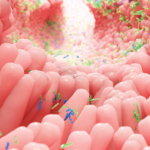Diet’s Impact
Could changing from carnivore to vegan positively affect a patient with inflammatory disease? “You can change microbial composition, but it takes a long time to make that change,” said Jonathan Braun, MD, PhD, professor of pathology and laboratory medicine at the University of California, Los Angeles, Geffen School of Medicine. In pediatric Crohn’s disease, gut dysbiosis is a prominent feature and often, the same bugs are found in the patient’s family. Parents and children often eat the same foods, he said.
Despite popular health claims, probiotics in foods like yogurt don’t change microbial composition, but they may change how they function in the gut, said Dr. Braun. Metabolites found in colonic samples may offer more accurate signs that a person is at risk for Crohn’s disease or inflammatory bowel disease (IBD), he added.
As many as 30 genes may “garden” our intestinal flora, and three that specifically affect susceptibility to inflammatory bowel disease are COSMC, Core 1 O-glycanase and Fut2, said Dr. Braun.
B Cell Expression
Microbiota also plays a role in protecting against systemic lupus erythematosus (SLE). Gut-associated lymphoid tissue (GALT) is a site of chronic B cell activation, said Jo Spencer, PhD, professor of immunobiology at King’s College in London.
“GALT generates the largest percentage of plasma cells in the body, most of which secrete immunoglobulin A (IgA),” said Dr. Spencer. “Our data suggest that in addition to this well-known function of GALT, exposure to microbiota in this microenvironment may support early stages of human B cell development in health.”
This process appears to go awry in SLE. “Unexpectedly, we found dramatic reduction in expression of β7 integrin by B cells in SLE patients,” said Dr. Spencer. “So we think GALT is compromised. IgA plasma cells are relatively less frequent,” and B cell development may also be perturbed in SLE patients as a consequence, she said. The reduced expression of β7 integrin by B cells in SLE is still apparent when B cells repopulate the blood after rituximab treatment.
Prebiotics & Probiotics
Although such foods as yogurt or kombucha may not live up to their lofty reputations, selectively fermented ingredients that allow specific changes in the composition or activity of gastrointestinal flora may confer health benefits, said David Mills, PhD, professor of food science and technology at the University of California in Davis. Probiotics delivered through breast milk to infants with necrotizing enterocolitis seem to help their symptoms, but “we really need to get a mechanism to understand this,” he said.


